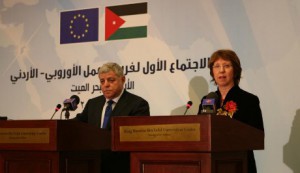27th February 2012
EU- Jordan Task Force: What was it all about ?
Many people will have seen the news of Wednesday’s EU-Jordan Task Force at the Dead Sea and will no doubt have been pleased by the announcement of €3 billion of financial aid.

But what was this event really about? And why was it important?
Understanding Europe’s unique mix of policies, legislation and diplomacy has never been easy. The European Union now has 27 countries with different histories, interests and political systems, so reaching agreement on sensitive issues is never easy.The joke goes that ‘the camel is the result of an EU committee that sat down to design a horse’.
For many Europeans the benefits of the stability and prosperity that the European Union has brought to its citizens over the last 60 years are taken for granted.
But they are incalculable. The very fact that the countries of East Europe all wanted to share Europe’s progress and benefits was a motivator to shed the shackles of communism.
Kissinger once said that he didn’t know who to call in Europe. There’s a clear answer now: Baroness Cathy Ashton who has responsibility for representing the EU abroad. She led the EU delegation to the Task Force last week, holding talks with the Jordanian government and announcing the benefits for Jordan.
The EU message was clear: we value our relationship with Jordan as a stable country in a region going through turmoil. “Change without chaos” was Cathy Ashton’s slogan. She underlined that the reform was owned by the Jordanians and Europe was not interfering.
And she made clear that Europe is happy to support that reform through financial assistance and loans. This funding will flow as Jordan makes progress on its reform programme.
So the importance of this event was threefold: first, the symbolism of Europe’s support for Jordan; second, the financial commitment to supporting the Jordan’s home-grown reform programme; and third, as the launch of a process to continue our dialogue.
The central message of the Task Force’s joint declaration was that 2012 is the year of delivery for Jordan. The European Union will back that goal.